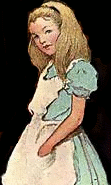Through the Looking Monitor: Alice in Wikiland
 What Does This Mean for Assessment?
What Does This Mean for Assessment?
While composition instructors have attempted various methods of assessment based on more than just the text, such as student participation, grasp of the material, ability to synthesize sources, and appearance of discourse assimilation, a new notion of audience means a new notion of assessing student writing in a wiki. Teachers need to understand how individual students create various pieces of text and how assignments are co-opted with other students. Composition instructors must develop rubrics that take into account the many factors involved in the audience, some of which are already in use, others that are new to the contextual medium. Examples of some of these factors include student participation in group work, students' ability to make decisions based on agreement between authors, students' ability to critique and edit the writing of others that will bear their own ideas, collaboration in the digital environment, use of multimedia, and understanding of the rhetorical and visual implications of wiki use (visual rhetoric for example). Categories to consider in evaluation range from construction of paragraphs, citation of sources, to use of linking capabilities and contribution. Ultimately, these rubric categories revolve around the question of how teachers can reconstruct methods of assessment in order to encompass and consider the new modes in which students are composing.
In the case of Alice, the teacher has created a technology narrative assignment to start the course wiki usage to be followed by posting of student drafts for peer review. How would the teachers evaluate such assignments? The instructor first needs to determine how to grade individual contributions versus group work (the same concerns that arise in traditional classrooms). Wikis do not alleviate the questions teachers face in classrooms that do not use web 2.0 technologies that revolve around grading group work contributions, but the wiki does offer a different mode of accomplishing certain tasks that may encourage participation and critical evaluation. For the individual work, Alice’s teacher could examine the wiki page revisions for individual students and the community pages for student login names (log-ins based on student identification set up by the teacher in conjunction with the IT department). Each iteration of a page is signed by the user’s login identity and thus teachers can record contributions this way.
In terms of group work, Alice’s teacher could assess student contribution as in individual work by viewing the revision history and comparing revisions/iterations of pages. The teachers could also suggest early on that any student commenting on another students writing should choose a different font color (different from the author of the draft) and sign the comments. For the narrative, the groups could be required to keep a participation journal (on a separate wiki page, a blog, or on paper) and the teacher could then review each student’s journal entries for an overall sense of participation. The assessment of Alice’s contribution would ultimately be based on both individual and group participation in the wiki. If a student such as Alice did not have the technological skills of other students then extra support may be needed early on in the form technology conferences or group sessions for those students.
It is my belief that wikis respect the “multiple points of entry” suggested by Tulley and Blair (2003) because wikis have the potential to “equalize knowledge among students rather than penalize those with fewer technological skills,” in part due to the low learning curve, ease of use, and constant accessibility (p. 59). The wiki provides an example of the eportfolio that Tulley and Blair offer as an assessment option because it situates multiple student writings in one electronically accessibly location for others to view and assess. Evaluators are not limited to one piece of writing and users may in turn view how affective student collaboration was on multiple projects.
One way that teachers could utilize the wiki space for assessment is to gather their ideas from assessing all the students’ work and post some guidelines and general trends that the teachers see evolving in the writing. A teacher could post a page that demonstrates how students are positively using their composing knowledge to develop effective writing. Second, teachers could post a page of common problems that students are having and make suggestions on correcting these problem areas. A teacher might also post heuristics on the wiki that students could follow throughout the writing process and these heuristics could contain links to further help on any number of points.
Immediately, I have offered that in the wiki the audience and author share a unique role, one that changes and trades positions with the other. The audience is a multifaceted mosaic of single, limited, and multiple members from varying background sharing topoi in texts, images, and links. Once Alice steps into this Wikiland, she is inundated with the strangeness that overtakes initial users. She sees a place where audience and author are the same person and share the same roles and responsibilities. It is as if Ferrell's forum were the dinner table from Alice in Wonderland, yet instead of only eating the food, Alice and her friends were bringing food to add to the main course, choosing what fit their needs and the context and what did not. Through this series of choices, the forum could decide on the best main course (composition). That main course would be a sight to see indeed. How this course will be assessed is not only a matter of taste, but the responsibility of composition scholars from across the disciplines. But where has the traditional notion of audience gone? Maybe it is still here, as a ghost in the machine.
